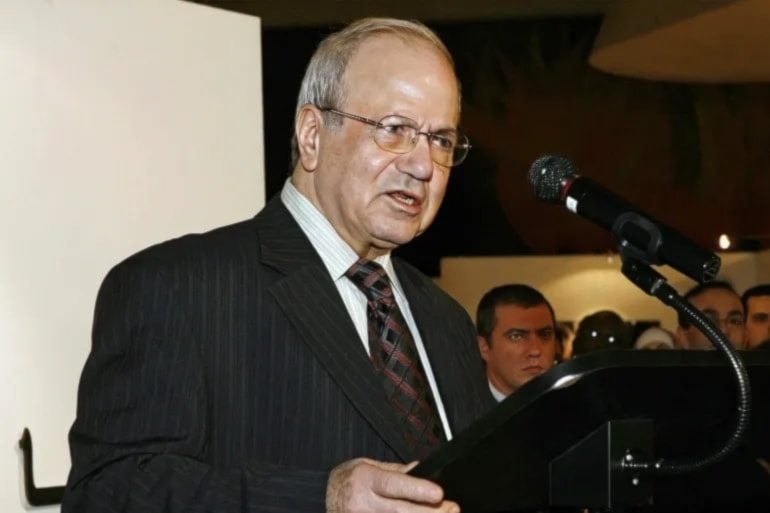Palestinians mourn leader Farouq al-Qaddoumi, Oslo Accords critic
Al-Qaddoumi was a member of the Fatah Central Committee, a former member of the Palestine Liberation PLO Executive Committee, and head of the PLO’s Political Department.
-

The late Palestinian leader Farouq al-Qaddoumi (News websites)
The Fatah movement announced on Thursday the passing of Palestinian leader Farouq al-Qaddoumi, also known as Abu al-Lutuf, at the age of 93.
A key figure who notably opposed the Oslo Accords, al-Qaddoumi was a member of the Fatah Central Committee, a former member of the Palestine Liberation Organization (PLO) Executive Committee, and head of the PLO’s Political Department.
Al-Qaddoumi passed away in the Jordanian capital, Amman, after suffering from illness, according to his family. His death comes less than two months after the passing of his wife, Nabila al-Nimr.
Palestinian factions mourn al-Qaddoumi
In a statement, Fatah mourned al-Qaddoumi, describing him as a prominent national figure who devoted his life to defending the Palestinian cause and the legitimate rights of the Palestinian people, including the right to return, self-determination, freedom, and independence.
The movement highlighted al-Qaddoumi’s remarkable contributions, leadership within Fatah and the Palestinian revolution, and involvement in significant national struggle milestones.
Palestinian President Mahmoud Abbas extended his condolences to the sons of the late leader in a phone call.
In a statement, Abbas added that al-Qaddoumi dedicated his life to defending Palestinian rights and the just cause of freedom and independence.
The Hamas movement also mourned al-Qaddoumi and said in a statement that the late Abu al-Lutuf was a steadfast figure in upholding revolutionary principles and a powerful voice in resisting all attempts to compromise the rights of the Palestinian people.
Hamas said that al-Qaddoumi spent his life defending Palestine, fighting against occupation, and rejecting all settlement and liquidation projects, foremost among them the "ill-fated Oslo Accords," which he, early on, warned against the dangers it could pose to the just Palestinian cause.
Meanwhile, the al-Aqsa Martyrs Brigades, the armed wing of the Fatah movement, highlighted that al-Qaddoumi began his national political activism at an early stage in his life.
According to the Brigades, the late leader became acquainted with Yasser Arafat, Salah Khalaf, and Khalil al-Wazir while studying in Egypt, participated in founding Fatah, was a contributor to its publication "Filastinuna", and served as a Central Committee member since 1965. He also represented Fatah in Cairo and headed its external relations, later becoming the Secretary-General of the Central Committee.
The Democratic Front for the Liberation of Palestine (DFLP) also extended its condolences, saying it bids farewell "to a brother and friend who embodied the spirit of dialogue, openness, consultation, and respect for national institutions, considering them the national reference for political decision-making and for shaping the present and future of our people and their cause."
Political journey
Al-Qaddoumi began his political career by joining the Arab Socialist Ba'ath Party in the 1940s. During his time studying in Egypt, he met Yasser Arafat (Abu Ammar), Salah Khalaf (Abu Iyad), and Khalil al-Wazir (Abu Jihad), with whom he co-founded Fatah in the late 1950s. Later, they established the Palestinian National Liberation Movement, which launched its first operation in early 1965.
In 1969, Fatah nominated al-Qaddoumi for membership in the PLO Executive Committee, where he initially headed the Popular Organization Department.
However, he moved to the Political Department after the 1973 Verdun Operation. Al-Qaddoumi resided in Jordan until the authorities detained him following the events of Black September in 1970, after which he relocated to Syria.
Al-Qaddoumi was among the PLO leaders who left Beirut for Tunis in 1983 following the Israeli invasion of Lebanon.
He strongly opposed the Oslo Accords signed in 1993, viewing them as a betrayal of the principles upon which the PLO was established. Consequently, he refused to return to the Palestinian territories with other PLO leaders and remained in Tunisia.
Al-Qaddoumi was also a vocal critic of the Fatah-Hamas dispute, warning that it would lead to widespread conflict among Palestinian factions.
Who was Farouq al-Qaddoumi?
Born in the village of Jinsafut in the Qalqilya Governorate of the West Bank in 1931, al-Qaddoumi and his family moved to Haifa in 1948 before returning to Nablus.
He completed his primary education in Jinsafut and secondary education in Yafa. In 1954, he enrolled at the American University in Cairo (AUC), where he earned a degree in economics and political science.

 4 Min Read
4 Min Read








